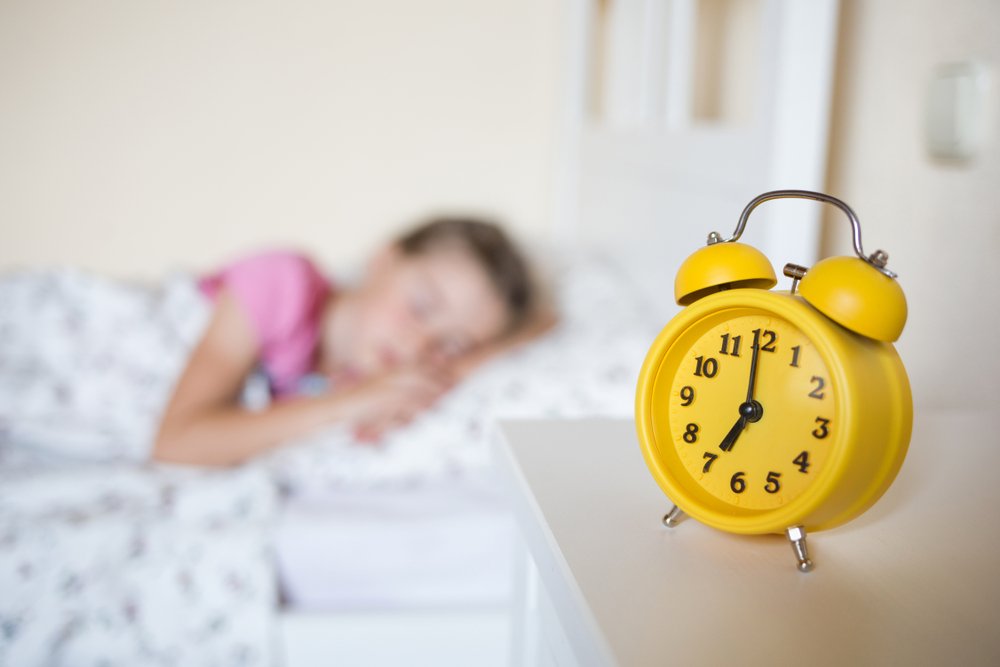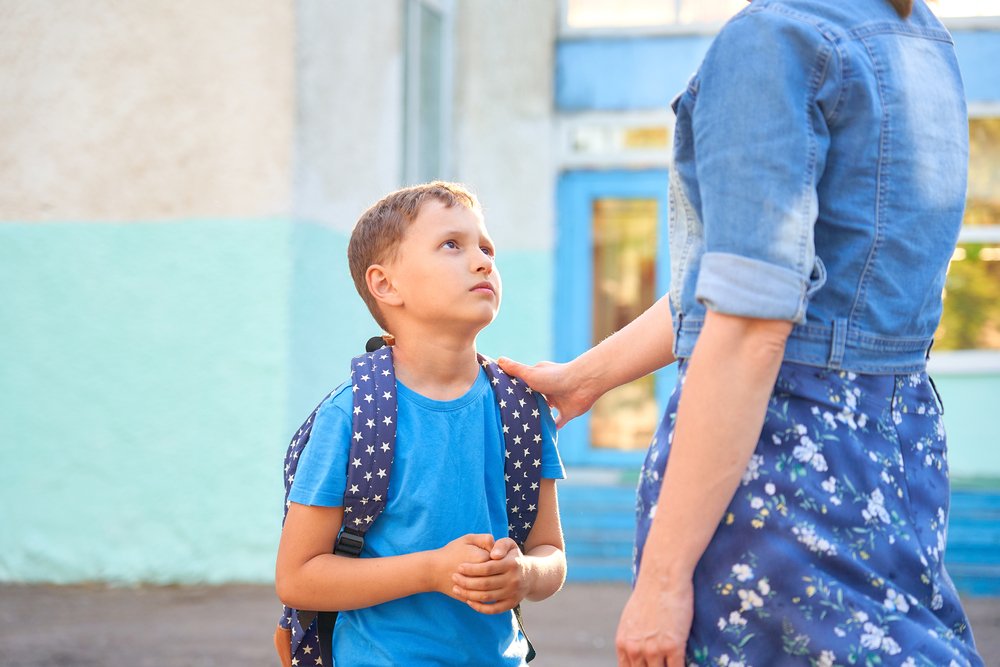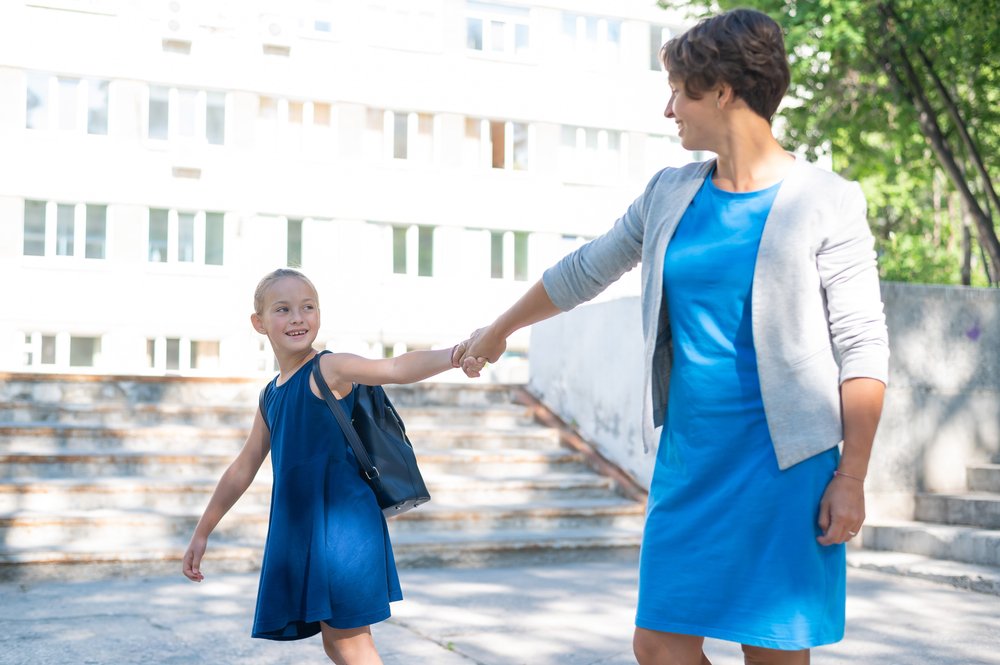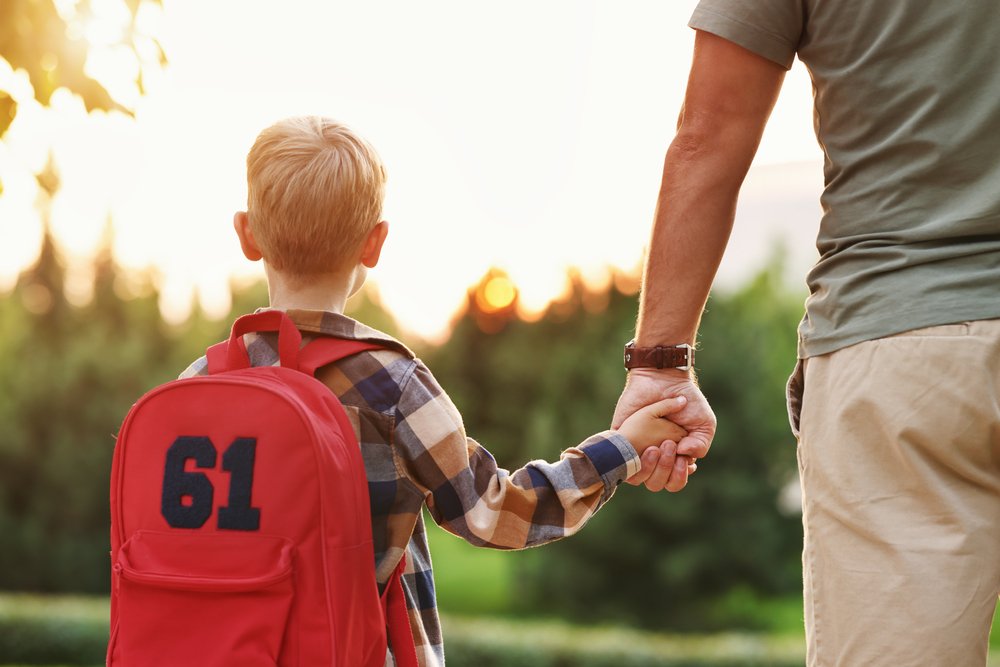First graders go to school with joyful excitement, older students with anticipation of meeting their friends and thinking about the school routine. But no matter what feelings a child may have, school adjustment is unavoidable. This process can last a month or even longer, and not only children go through it, but also parents. To ease this period, use these 7 tips. They will help you get used to school with a minimum loss of nerves and health.
Get ready in the evening
This doesn’t just apply to the first of September, and it’s not just about the briefcase. Just as adults want to be warned ahead of time about what’s going to be at work tomorrow, so does a child need to know what to wear and what to bring with them, whether there will be a doctor’s appointment, photographers, or assembly at school tomorrow. So give a warning in the evening – including if you have a non-standard routine, such as picking up your child from after-school care one day and not the next.
Although many are used to being sure to be picked up at home while still in kindergarten, some children may feel tension and insecurity about the parent’s return guarantee. So you might want to run through in advance what time you’re picking your child up from school (and not be late).
Tip!
Especially unsure children – for example, if they didn’t go to kindergarten or if one of their parents liked to “leave in English without saying goodbye” – should be given a reminder with them – like a small picture of the two of you and a small toy or thing from home.
The evening is also a bedtime routine. The younger a student is, the more he or she needs to sleep, especially when stressed. And the stress of starting school is comparable in intensity to the stress of having a baby in the family.
So put your child to bed early: he has enough stress hormones (adrenaline and cortisol), and you don’t want the added lack of sleep to cause a nervous breakdown. And sleep deprivation, according to scientists at Concordia University, increases cortisol levels even in babies.
Many first graders, even those who have long forgotten about quiet time, don’t mind going back to it for a while. If you see that the child becomes lethargic and pecking his nose during the day, offer him to lie down.
Good morning is important!

When a child wakes up, it’s important for him to tune in positively (for an adult, too). So feed his mood with your own and remember that rushing suppresses that positivity.
It is better to set an alarm clock with 10-15 minutes to spare and in that time let the child wake up slowly and cuddle or – depending on his character – do exercises together.
Tip!
A hug from a loved one is pleasant at any age. Researchers at Ohio State University have proven that a 30-second hug increases serotonin and oxytocin levels.
And these are hormones not only of happiness and love, serotonin is also necessary for successful learning, it increases concentration and improves memory. So if your little one is too big to cuddle, tell them it’s for school! Even teenagers find it helpful (despite their frowning looks).
Stick to your morning routine
Just as the evening routine sets you up for sleep, the morning routine sets you up for the day. Activities in the morning should be repetitive and monotonous, such as exercise, bath, make your bed, breakfast, get dressed, and go out.
Tip!
It is better to introduce a rule not to be distracted by gadgets and not to turn on TV in the morning, so that attention is not dispersed. The rule should apply to adults as well – children are best educated by example, not by words.
If a child doesn’t want to go to school

Sooner or later all parents hear this: “I don’t want to go to school. Don’t be shocked: it’s normal. The reason can be the weather, an unloved subject or tiredness, as well as serious factors – quarrels, fights, bullying classmates. What to do if the child says that he doesn’t want to go to lessons?
- Accept and mirror the feelings: “I so understand you! I don’t feel like going to work today either (to the store, to take my youngest to kindergarten).” As a rule, this is enough – your reluctant child hears that he is not alone, and you share his feelings. But you will go to work anyway.
- Take with example: “I also often didn’t want to go to class when I was in school. Especially in winter, when it was cold outside and you had to put on woolen leggings, and they made your feet so itchy!” Or you didn’t like math first period-something you definitely didn’t like in school, so give me an example.
- Try to see if there’s a specific reason and offer to solve the problem. For example, not all first graders are successful in changing into their uniforms after PE – offer to write a message to the teacher for the child to help.
Tip!
To reduce the number of such refusals from school, you can conduct play therapy with the help of toys or use projective techniques. For example, complain that the bear cries every morning that he does not want to study, what to do? Sometimes in such a game the child tells that the bear is “pushed at school” or “forced to finish the soup for lunch.
In projective techniques, a sad bear with a briefcase or school can be drawn – and children comment on the drawings or draw their own “based on motifs.”
The teacher in elementary school is an authoritative adult
It was before school that you were the most knowledgeable, but in first grade that place should be taken by the teacher. The teacher’s authority is built in the first 2-3 weeks. If everything is done correctly and the child has contact with him, you will hear a variation on the theme that writing/counting/coloring should not be done your way, but as Marina Vitalievna said.
If the teacher failed to take a position of a significant adult, the process of adaptation to school will be delayed. In this case it is necessary to communicate with the teacher and find a solution (and an experienced teacher will offer you to discuss the situation).
Strengthen friendships

School is not just for learning. The socialization process doesn’t end in kindergarten (and some don’t even go to kindergarten). So it’s important to have at least one buddy or friend in class. The earlier the child starts to be friends with someone, the easier and better it will be at school.
It is good if children go to the same class after kindergarten, but if everyone is unfamiliar, you need to help strengthen the bond. As a rule, the appearance of a friend is manifested in the child’s stories “Alexander shared felt-tip pens, Alexander brought an apple in pieces, we ran with Alexander at recess. If you don’t hear such phrases, you can ask the child or the teacher which of the children are friends and offer to play together after school, meet on weekends, invite them to visit, etc.
After school you need to take the pressure off
Sitting silently at the desk and strenuously listening to the teacher’s words is hard both physically and emotionally. Help your child get rid of this tension: the best way is to go to the playground (or school stadium) after school and let him run and jump around for half an hour. Even 10 minutes of fast jogging can be enough to get the emotions in order.
That tension is accumulating, you will be prompted by the child’s night wakes and scary dreams, episodes of bedwetting from stress, bad habits – chewing nails, pencils, pulling out hair, etc. All of this should wear off as he adapts. In addition, the same stress and the new collective contribute to various illnesses. Pediatricians even have a separate name for the very first “sickness” of schoolchildren.
Sources used
- Poor sleep as a pathophysiological pathway underlying the association between stressful experiences and the diurnal cortisol profile among children and adolescents / Ly J, McGrath JJ, Gouin JP. // Psychoneuroendocrinology. – 2015
- Adrien J, Dugovic C, Martin P. Sleep-wakefulness patterns in the helpless rat. Physiol Behav. 1991;49:257–262. http://dx.doi.org/10.1016/0031-9384(91)90041-L. [PubMed] [Google Scholar]
- Balbo M, Leproult R, Van Cauter E. Impact of sleep and its disturbances on hypothalamo—pituitary—adrenal axis activity. Int J Endocrinol. 2010;2:1–16. http://dx.doi.org/10.1155/2010/759234. [PMC free article] [PubMed] [Google Scholar]
- Born J, Fehm HL. Hypothalamus—pituitary—adrenal activity during human sleep: a coordinating role for the limbic hippocampal system. Exp Clin Endocrinol Diabetes. 1998;106:153–163. http://dx.doi.org/10.1055/s-0029-1211969. [PubMed] [Google Scholar]
- Buckley TM, Schatzberg AF. On the interactions of the hypothalamic—pituitary—adrenal (HPA) axis and sleep: normal HPA axis activity and circadian rhythm, exemplary sleep disorders. J Clin Endocrinol Metab. 2005;90(5):3106–3114. http://dx.doi.org/10.1210/jc.2004-1056. [PubMed] [Google Scholar]
- Cheeta S, Ruigt G, van Proosdij J, Willner P. Changes in sleep architecture after chronic mild stress. Biol Psychiatry. 1997;41:419–427. http://dx.doi.org/10.1016/S0006-3223(96)00058-3. [PubMed] [Google Scholar]
- Cohen S, Kessler RC, Underwood LG. Strategies for measuring stress in studies of psychiatric and physical disorders. In: Cohen S, Kessler RC, Underwood LG, editors. Measuring Stress: A Guide for Health and Social Scientists. Oxford University Press; New York, NY: 1995. pp. 3–28. [Google Scholar]
- Cohen S, Kamarck T, Mermelstein R. A global measure of perceived stress. J Health Social Behav. 1983;24:385–396. http://dx.doi.org/10.2307/2136404. [PubMed] [Google Scholar]
The articles on this site are for information purposes only. The site administrators are not responsible for attempting to apply any recipe, advice or diet, nor do they guarantee that the information provided will help or harm you personally. Be cautious and always consult a doctor or nutritionist!
*All products recommended are selected by our editorial team. Some of our articles include affiliate links. If you buy something through one of these links, you help us earn a small commission from the seller and thus support the writing of useful and quality articles.





